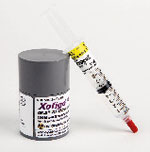Bone Metastases Treatment with Metastatic Castration-Resistant Prostate Cancer

However, prostate cancer cells can develop resistance to conventional hormonal therapy. This condition is called metastatic castration-resistant prostate cancer. New treatments are becoming available for this condition.
Radium-223 Trial a Success
Researchers reported favorable results from a phase 3 study analyzing radium-223 in men with castrationresistant prostate cancer with bone metastases. The study showed that radium-223 prolonged overall survival with a 30% reduction in the risk of death when compared to the placebo.
Radium-223 is a targeted alpha particle emitter that naturally travels to the bone. There, it releases high-energy alpha particles with a short range, which limits damage to other tissue.
The researchers said that at least 20-40% of patients with castration-resistant prostate cancer and bone metastases never receive chemotherapy, and current therapies that target the bone have not been proven to improve survival rates. Radium-223 could help this group of men who are not receiving other types of treatment.
Radium-223 was recently approved for use to treat prostate cancer with bone metastases in the US.
Parker C. et al. Alpha-Emitter Radium-223 and Survival in Metastatic Prostate Cancer. N Engl J Med. 2013; 369(3);213-223
Cabozantinib undergoing trials for prostate cancer
The drug cabozantinib is being studied for treatment of metastatic castration-resistant prostate cancer. A phase 2 study of cabozantinib with a dosage of 100 mg daily showed improvement in bone scans, but patients experiencing adverse events caused frequent dose reductions. A study published in Clinical Cancer Research examined the efficacy of the drug at lower doses. Patients who took cabozantinib at a dosage of 40 mg daily were associated with a high rate of bone scan response and reported better tolerability than patients who took the drug at a higher dose. These results informed the design of the phase 3 studies for cabozantinib, which are currently enrolling patients.
Lee R. et al. A dose-ranging study of cabozantinib in men with castration-resistant prostate cancer and bone metastases. Clin Cancer Res. 2013; 19(11):3088-94










